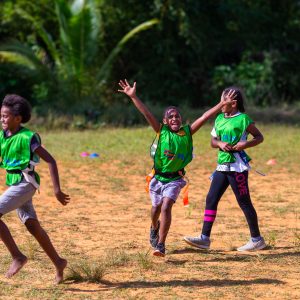Fiji has a rich history of sports passion and expertise. With rugby as one of the most loved games in the country, Get into Rugby PLUS is maximising the benefits of the sport by using it as a tool to drive social change. It helps build the confidence and resilience of young people, promote positive behaviour, and challenge gender stereotypes.
Female Role Models in a Male-dominated Sport
“Women and girls can be just as successful in sport as men and boys, and I have proven that,” said Kitiana Kaitu, Fiji Rugby Union’s Get Into Rugby PLUS Coach and Educator. Kitiana shared her experience of taking on the role of a leader in a sport traditionally deemed as male-dominated.
“When I first began coaching the school’s first rugby team five years ago, a lot of men looked down on me. They would say ‘You should be cooking at home. This is no place for a woman!’ Despite the challenges and the constant criticism during tournament days, we kept pushing on,” she shared.
“I have always encouraged my girls and have always told them that if they believed in themselves, they could move mountains. So the girls kept playing and I continued to coach them. We won many games over the years.”
Kitiana said that thanks to Get into Rugby PLUS, more women and girls started to get involved in rugby. “Those who used to look down on us are now cheering for us. I could say that as females, we showed them that we are here to stay. Rugby is inclusive, it is a sport for all,” she said.
Lavenia Yalovi, Fiji Rugby Union’s National Coordinator for Get into Rugby PLUS talked about some of the positive impacts she has witnessed: “In some schools and communities, it is observed that boys and girls now respect each other more. For example, boys no longer shout at or give negative comments when seeing girls play rugby. They cheer them instead.”
“Boys and girls are also seen sharing responsibilities off the field. The boys sweep the classroom, cleaning the windows. Parents also said that their son started helping out with chores at home.”
For Lavenia, having the chance to be part of Get into Rugby PLUS is something that means a great deal to her.
“It has helped me to speak up on issues affecting women and girls such as violence. I am an advocate for gender equality, especially in this male-dominated sport.”
“As a mother, it has also helped me, not only by providing income, but by raising my son with values, sport skills and life skills that will enable him to become a good player, son, friend and in the future to be a successful and humble man.”
Story of Emelina
Unaisi Vakarewa is a proud mother to 13-year-old Emelina. Before Emelina joined Get into Rugby PLUS as a player in 2019, Unaisi said her daughter was shy, never hung out with others, and had always kept to herself. But joining transformed Emelina in so many ways.

By becoming a player, Emelina got opportunities to spend time playing rugby and learning life skills with other children. Emelina started to open up, socialising more with her friends. She became more confident and her communications skills improved.
Unaisi said she is very happy about the changes in her daughter. Unaisi also acknowledged how life skills learning has made a great impact on Emelina. She learned skills on how to solve problems and to make decisions for herself. Emelia has become more independent. Unaisi hopes Get into Rugby PLUS can be expanded to more schools so that more children can have the same opportunities that her daughter is having, to play and to be empowered to become a future leader.
The story was developed from content provided by Oceania Rugby and Fiji Rugby Union.
Oceania Rugby is one of six regional associations of World Rugby, responsible for representing the interests of its Members. Oceania Rugby’s sport for development programs contribute to achieving gender equality, reducing inequality, and ending violence against women and children, and are built around the rugby values.
Fiji Rugby Union was established in 1913 and is the governing body for rugby union in Fiji. Fiji Rugby Union is a full member of Oceania Rugby and became affiliated World Rugby in 1987.
To learn more about Get into Rugby PLUS, click here.





























